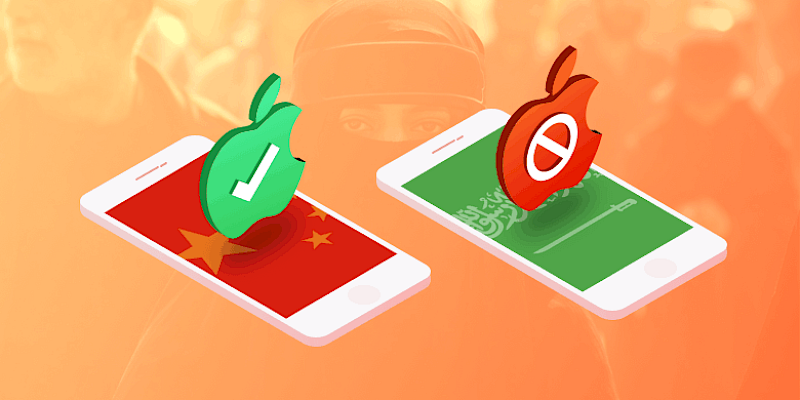
Censorship
Apple’s Response to Saudi App Controversy Indicates a Different Moral Standard for China
In modern Saudi Arabia, an app that has been exploited (and partially designed) for a rather medieval purpose is currently available in the app stores of both Apple and Google. The Absher app is the official app of the Saudi Interior Ministry and is widely used for administrative purposes in Saudi Arabia, where it’s deployed for the sake of valid record keeping in the case of driver’s licenses, immigration documentation, and census numbers, but it is no secret that it is also sanctioned to use as a way to monitor and even to restrict the travel of Saudi women. The app allows for male Saudi “guardians” to access government services and list female “dependents” by name and passport, effectively giving them dominion over whether these women can travel or not. The Saudi Interior Ministry website indicates that there are more than 11 million users of Absher, which in a country of roughly 33 million people would imply that 1 in 3 Saudis are using the app (mostly males).
Apple CEO Tim Cook has tried to play damage control with the bad optics that revelations about the sale of Absher in the Apple app store has created for his company, stating that Apple will “take a look”, while Google has thus far refused to comment on their sale of the app.
Meanwhile, U.S Senator Ron Wyden of Oregon has not minced words, writing a pointed letter to Tim Cook on the matter and urging Apple to withdraw the app from their stores. In the senator’s letter he stated: “In evaluating whether an app should be allowed, app store providers should be considering the broader context of the purpose of the app, how it is used in practice, and whether it facilitates serious abuses.” Far from being used to know the whereabouts of children past curfew or to monitor senior citizens, the sale of the app by both Apple and Google has garnered outrage from human rights groups who share Senator Wyden’s concerns about the true purpose of such an app.
What’s additionally disconcerting about the Apple response to this issue is that if they succumb to international pressure to do the right thing and remove the womanizing app, despite it being legal and embraced in Saudi Arabia, they will signal that they operate by a different code of ethics in countries that deeply impact their bottom line than they do in those that do not.
Because our memories are not so short as to forget how Mr. Cook and Apple responded to pressure from the Chinese government to censor the sale of VPN apps that the communist regime deemed offensive to the state. If Apple’s previously stated business prerogative was to remove VPN apps from Chinese app stores because companies “must respect the laws of country you do business in”, despite the fact many apps were removed without being in violation of any specifically written law, then it seems that they have a rather shapeshifting approach toward whatever standards they’re willing to hold themselves to in order to do business in different countries.
If the Absher app is deemed legal in Saudi Arabia but Apple decides to remove the app, then Apple is admitting they are a hypocrite. Apple is admitting that the Chinese people’s right to access the Internet is not as important as protecting woman’s rights in Saudi Arabia. By not relying on local laws to determine what is available in their app store, Apple has put itself in a position to behave as the arbiter of what is right and what is wrong or what is in fact a human right and what is not.
One can’t help but wonder if iPhones were made in Saudi Arabia instead of China how different and immediate the Apple response to the laws of that land may have been. It’s hard not to be cynical with the fact their business ethics seem to be moving targets, because it seems to say loud and clear to us that “we respect the laws of a country (and cave to political pressure) if we build all of our iPhones there”.
Which means that the ultimate Apple ethos is that the bottom line is prized more highly than whatever their present definition of human rights may be.

